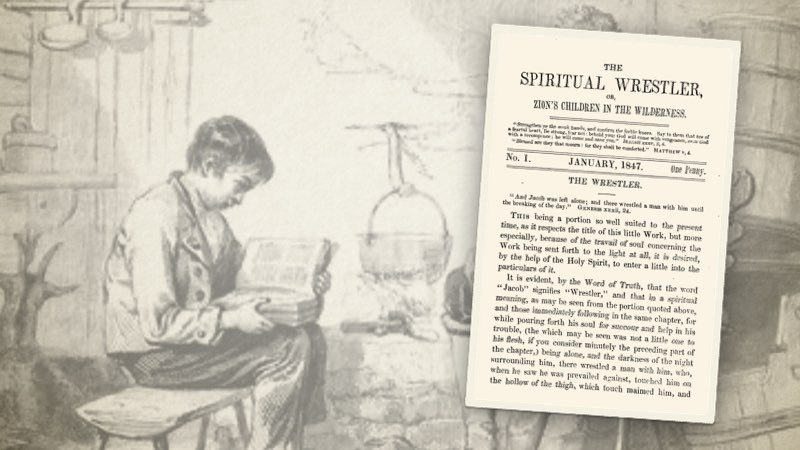
He Cares For You
The Spiritual Wrestler 1847, Page 163
“He Careth For You.”—1 Peter 5:7
Dear Friend, and Brother in the Lord,—This comes in covenant love to you and your’s, hoping it will find you much better, with your harp taken down from the willows, and a new song put into your mouth, and your feet firm upon the rock, believing you are an inhabitant of Jerusalem. Isaiah says, “Let the inhabitants of the rock sing, let them shout from the top of the mountains; let them give glory unto the Lord, and declare his praise in the islands. For I will bring the blind by a way that they know not; I will lead them in paths that they have not known; I will make darkness light before them, and crooked things straight; these things I will do unto them, and not forsake them.” Again, “But now, thus saith the Lord that created thee, O Jacob, and he that formed thee, O Israel, Fear not, for I have redeemed thee, I have called thee by thy name; thou art mine. For I am the Lord thy God, the Holy One of Israel, thy Saviour. I gave Egypt for thy ransom, Ethiopia and Seba for thee. Since thou wast precious in my sight, thou hast been honourable, and I have loved thee; there fore will I give men for thee, and people for thy life.” Who is this spoken to? Why, the poor, the lost, the tried, the tempted, the cast out, the maimed, the helpless, the broken-hearted, and the despised, whose name is cast out as evil, by the world, and worldly professors, by wicked men, and all hypocrites in Zion. But our dear Lord has said, “He that is despised, and hath a servant, is better than him that honoureth himself and lacketh bread.” Again, the Word says to all the enemies of his true Church, “Wonder, and perish, ye despisers; for, behold, I work a work in your day, a work which ye shall in no wise believe, though a man declare it unto you.” O, my Friend, this good work upon the souls of his people, “is what no fowl knoweth, the fierce lion hath not trodden it, nor have the lion’s whelps gone thereon, neither hath the vulture’s eye seen it.” Mr. Huntington says, it is not a Form of Godliness without the Power, nor an Empty Profession void of Possession, nor is it a Dry Barren Ministry, that will incur the displeasure of these despisers, no, this will not do it, so says Mr. H., and so says I; then what is it? It is the enforcing the application of God’s Holy Law to the heart and conscience, to condemn and kill the poor sinner to all hopes in a killing commandment, and the application of Christ’s blood to cleanse the heart from all guilt, before the peace of God can be known; it is this that is despised by all the enemies of truth.
May the blessing of the Lord be with thee,
Your’s to serve, W. B.
C_____, Nov. 1, 1847
It may be argued the Strict and Particular Baptist churches of the 17th, 18th and early 19th centuries were at their strongest when they remained independent congregations, unaffiliated with Magazines and Societies. This strength was lost during the latter half of the 19th century when the churches clamored around favorite periodicals and regional associations. Although the Magazines were largely responsible for creating a party-spirit and culpable for stirring up needless controversy, they nevertheless contain many valuable resources which may prove a blessing for this generation. Although they differed on various points of doctrine, they invariably held to high views of sovereign grace, denouncing as heresy the pernicious teachings of Andrew Fuller. The majority of Strict and Particular Baptist churches during the 18th and 19th centuries were Hyper-Calvinists.



